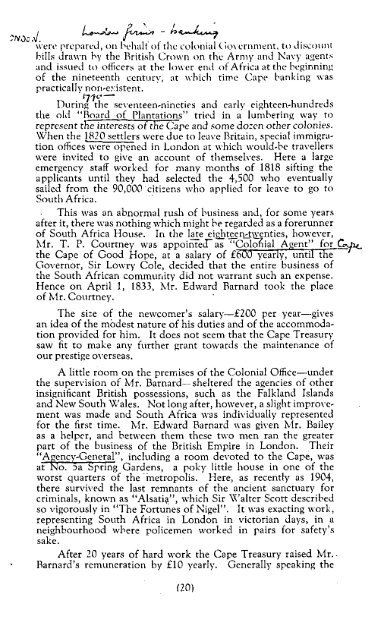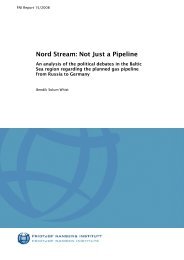SAIIA SOUTH AFRICAN DIPLOMATS ABROAD.pdf
SAIIA SOUTH AFRICAN DIPLOMATS ABROAD.pdf
SAIIA SOUTH AFRICAN DIPLOMATS ABROAD.pdf
You also want an ePaper? Increase the reach of your titles
YUMPU automatically turns print PDFs into web optimized ePapers that Google loves.
were prepared, on behalf of the colonial Government, to discount<br />
bills drawn by the British Crown on the Army and Navy agents<br />
and issued to officers at the lower end of Africa at the beginning<br />
of the nineteenth century, at which time Cape banking was<br />
practically non-e.vistent.<br />
During the seventeen-ninettes and early eighteen-hundreds<br />
the old "Board of Plantations" tried in a lumbering way to<br />
represent the interests of the Cape and some dozen other colonies.<br />
When the 1820 settlers were due to leave Britain, special immigration<br />
offices were opened in London at which would-be travellers<br />
were invited to give an account of themselves. Here a large<br />
emergency staff worked for many months of 1818 sifting the<br />
applicants until they had selected the 4,500 who eventually<br />
sailed from the 90,000 citizens who applied for leave to go to<br />
South Africa.<br />
This was an abnormal rush of business and, for some years<br />
after it, there was nothing which might be regarded as a forerunner<br />
of South Africa House. In the late eighteervtwenties, however,<br />
Kir. T. P. Courtney was appointecTas "Colonial Aflent" for<br />
the Cape of Good Hope, at a salary of £600 yearly, until the<br />
Governor, Sir Lowry Cole, decided that the entire business of<br />
the South African community did not warrant such an expense.<br />
Hence on April 1, 1833, Mr. Edward Barnard took the place<br />
of Mr. Courtney.<br />
The size of the newcomer's salary—£200 per year—gives<br />
an idea of the modest nature of his duties and of the accommodation<br />
provided for him. It does not seem that the Cape Treasury<br />
saw fit to make any further grant towards the maintenance of<br />
our prestige overseas.<br />
A little room on the premises of the Colonial Office—under<br />
the supervision of Mr. Barnard—sheltered the agencies of other<br />
insignificant British possessions, such as the Falkland Islands<br />
and New South Wales. Not long after, however, a slight improvement<br />
was made and South Africa was individually represented<br />
for the first time. Mr. Edward Barnard was given Mr. Bailey<br />
as a helper, and between them these two men ran the greater<br />
part of the business of the British Empire in London. Their<br />
"Agency-General", including a room devoted to the Cape, was<br />
at No. 3a Spring Gardens, a poky little house in one of the<br />
worst quarters of the metropolis. Here, as recently as 1904,<br />
there survived the last remnants of the ancient sanctuary for<br />
criminals, known as "Alsatia", which Sir Walter Scott described<br />
so vigorously in "The Fortunes of Nigel". It was exacting work,<br />
representing South Africa in London in Victorian days, in a<br />
neighbourhood where policemen worked in pairs for safety's<br />
sake.<br />
After 20 years of hard work the Cape Treasury raised Mr.-<br />
Barnard's remuneration by £10 yearly. Generally speaking the<br />
(20)













